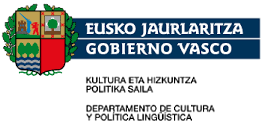Dokumentuaren akzioak
‘It’s like a Basque Ironman’ – Boise State alum talks Jaialdi

Elise Overgaard (PhD, biomolecular sciences, ’22) is a Boise State alum whose involvement in Boise’s Basque community extends to Jaialdi — the large Basque festival held every five years — and beyond.
At Boise State, Overgaard worked with Juliette Tinker, professor of biological sciences, on a cholera toxin-based staph vaccine to prevent mastitis in dairy cows. Overgaard also received her graduate certificate in technical communication from Boise State.
Overgaard’s connection to Jaialdi goes back to before she was born. Her mother, Megan, was one of the coordinators of the first Jaialdi in 1987, and was eight months pregnant with Elise when the festival actually took place. Overgaard’s father, Wil, led the festival’s security and valet parking teams made up of the Bishop Kelly High School football players he coached.
Overgaard has participated in the Oinkari Basque dance group since 2004. Along with a few friends, Overgaard also started the band Triki Taka Stomp, which gets its name from the trikitixa (also called triki), a traditional Basque diatonic button accordion, and is a play on the phrase “tiki taka,” or step-by-step in Basque.
When she’s not at dance or band practice, Overgaard can be found at the local Basque restaurant Ansots, where she and her partner, Johnny Boyd, work as sausage-makers. Overgaard and Boyd made over 2,500 pounds of hand-crafted Basque chorizos in the weeks leading up to this year’s Jaialdi.
Q. Tell us about the two Basque dancing groups you’re a part of: Oinkari and Oñati.
A. The Oinkari group is the original Basque dance group in Boise which started in 1960.
A lot of the current Oinkari dancers are grandchildren or otherwise related to the original Oinkari dancers. It’s really important to us to keep the tradition going. My mom danced too. She was a dance director, and I wear a few of her old costume pieces when I dance.
Whereas Oinkari dancers do dances from all seven provinces of the Basque Country, the Oñati dance group is specific to a singular town. Oñati is this little town tucked in the mountains. The color green probably came from Oñati — it’s the most magical place.
Boise State’s Oñati exchange program in 1974 formed a deep relationship between the cities of Boise and Oñati, and part of that relationship is dancing.
In Oñati, dancers perform a specific suite of dances every year during the Catholic holiday of Corpus Christi. With their blessing, we do them too. It’s kind of a group reserved for experienced or veteran dancers. The dances themselves are very athletic. We train really hard so everyone can technically execute the steps, but it’s way more than that. If you’ve ever talked to someone who does rowing, like crew, they talk about getting in the flow with their teammates. The boat doesn’t function if one oar is off. That’s what these dances feel like. You have to be so together. One boat, one body, one mind.

Q. This year, you are the first woman in the U.S. to captain the Oñati dances. What does this achievement mean to you?
A. I grew up watching the Oñati dancers. I always looked up to them, and I always wanted to be a part of it. My little brothers and cousins had the opportunity to, but I didn’t. There was not a spoken rule that women couldn’t participate, but as a girl, you would never ask to be a part of it.
It’s a thing I grew up wishing for. And now, it’s an honor to know that I am good enough to perform with this group and that talent and hard work in Basque dance can be recognized regardless of gender. My nieces will grow up next to my nephews, both feeling like someday they might dance in those costumes together. It’s also an honor to be trusted with a leadership role, maintaining the special relationship between Oñati and Boise.
Q. You and a few friends started the band Triki Taka Stomp in 2024. Why did you decide to start it?
A. We are all dancers, and we really wanted to have more opportunities to dance. We’ve been digging through our parents’ basements and attics, unearthing all of the middle school instruments we could find, getting them in working shape, and practicing.
Last year there was no band to play an important Basque event. Dan Ansotegui, who is kind of a legend in the Basque music world, said, ‘Well, why don’t you guys play?’ Since then, we’ve realized that there really was a gap to be filled in terms of Basque music. We just played our 13th gig.

Q. What do you hope attendees took from Jaialdi?
A. I know that I’m supposed to say I hope visitors learned and experienced our Basque culture. But what I really wanted them to see was that we are here all the time, not just during Jaialdi, and the people who make this thing happen wear so many hats — or really, so many pairs of shoes.
It’s like a Basque Ironman. You’re dancing, you’re playing music, then chucking heavy wet trash bags into a dumpster, pouring drinks in the bar, slinging chorizos in the food booth, putting up and taking down festival lights and signage, hauling ice bags, and trying to have fun too. You’re giving pep talks to your friends, helping them nurse injuries, trying to keep them going. Everyone is worn out and exhausted. But it’s so cool when the streets and Basque Center are packed full of people. The drinks, the dancing, and the music are here. It’s the really special energy in those moments that makes it all worth it.
Dokumentuaren akzioak






